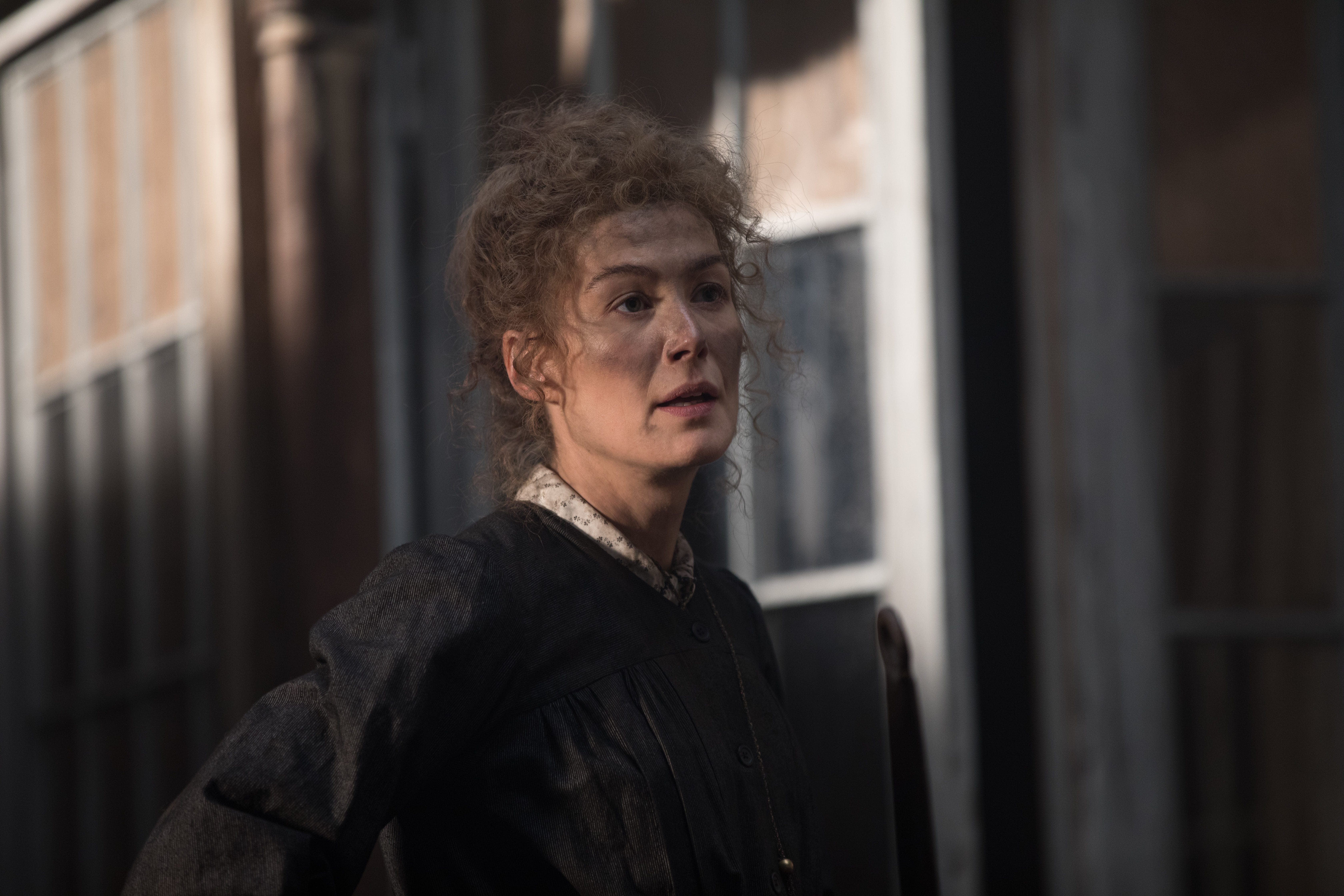
Marie Sklodowska-Curie is more than likely a name that you’ve heard in your high school chemistry class. A two-time Nobel Prize winning physicist and chemist, her story has been told in films like Madame Curie (1934), where Greer Garson portrayed her, and Marie Curie: The Courage of Knowledge (2016), where she was portrayed by Karolina Gruszk, but now is a better time than ever to see a deeper dive into Curie’s life.
Thankfully, director Marjane Satrapi and Amazon Studios have brought us an adaptation of Lauren Redniss’ 2010 graphic novel Radioactive, which depicts not only Curie’s personal life, but also her work in discovering polonium and radium, her efforts during WWI and her legacy. It also intercuts moments of her life with moments in history, like advancement in cancer treatments and the dropping of the atom bomb, that came to be because of her discoveries.
Rosamund Pike is excellent as Curie, as she drives the film with Curie’s determination and passion for her work and creates a deep sense of empathy for how she’s viewed as a woman in science. Hidden behind her self-absorbed attitude and reclusiveness, Pike makes Curie someone with a genuine passion for life that comes out when she’s in her lab or simply with her husband/research partner Pierre (Sam Riley). The chemistry between Pike and Riley is truly magnetic and Pierre comes off so likeable because Riley is putting in an equally strong performance. He is one of the only people that values Curie’s love for science and is able to bring her out of her shell. He sees her as an equal, sometimes even better than him, and he ends up being the kind of trusting person that makes Curie feel like her voice is being heard, that her intelligence isn’t intimidating, and that she can make breakthroughs in her work.
For the first half or so, Radioactive mainly focuses on Marie and Pierre’s whirlwind romance and how their partnership shocked the science world as they discovered polonium and radium. However, after their exposure to radium makes them sick and Pierre suffers a fatal tragedy, a different side of Curie comes out and we see Pike really come into her own in the role. From how her eventual romance with Paul (Aneurin Barnard) makes her an enemy in the public eye and how that relationship affects her receiving her second Nobel Prize, to the impact of Pierre’s death and their research together has on her health, Curie’s story becomes incredibly compelling.
It’s incredibly intriguing to watch her go from being world-renowned to be being caught up in a scandal and the moments of slight regret she has about the ramifications about her discoveries are very relatable and poignant. As her health starts to deteriorate and she’s seen in a much harsher light, the more human qualities of Curie’s story come to light. There’s even a great relationship that builds in the film’s final acts between Curie and her daughter Irene (Anya Taylor-Joy) as they help during WWI that’s heartwarming because of how they care for one another and grow to respect each other’s views.
However, even though Radioactive touches on Curie’s story in a much deeper and detailed way than usual, that doesn’t mean it always goes past the surface. The film so rapidly moves through its checklist of things to touch on that it leaves more questions than answers. Things like Curie and Irene’s relationship throughout her life, her efforts during WWI, and how the women’s movement in Stockholm helped her get to give her speech for her second Nobel Prize are sort of glossed over and it’s hard not to feel this sense of disappointment that these initially great moments aren’t fleshed out more. There’re also some typical montages of things like Curie doing work and facing rejection that could’ve been more impactful to see.
The film also struggles to show more than tell in its feminist reading of Curie. Dialogue about the scrutiny that women face in male-dominated fields is fine and dandy, but the film spouts lines we’ve heard before and doesn’t add anything new to its narrative. Not to mention, it doesn’t capitalize on some of its striking visuals, like the women of Stockholm first giving Curie a round of applause at her receiving her second Nobel Prize or an incredibly impactful photo shown before the credits.
While the film also does something unique in displaying the impacts that Curie had on the world even after she’s gone, it ends up being counterproductive and mixed about how you’re supposed to feel about her. On one hand, this is something that I’ve never seen in biopics and think it’s actually interesting to see someone look through the impact of their actions on history. These moments are the kind of visually stunning storytelling that could’ve been more effectively used throughout—especially because the super tech-driven score from Evgueni and Sacha Galperine is awesome. Not to mention, I kind of respect the transparency in telling Curie’s story and not making her out to be perfect.
On the other hand, the way these scenes are layed out kind of gives Curie’s work a negative connotation since she unknowingly and unintentionally caused these things to happen. It’s not that you come away hating her, but the film doesn’t make the purpose of these scenes clear and even when we finally see Curie looking over the results of her actions, we get no clear emotions or thoughts from her. Perhaps, it ties into Curie’s fears and regrets about her discoveries, but it just never comes across clearly and fails to leave a deep impact.
Although its flawed storytelling keeps it from being a crown jewel in telling Curie’s story, Radioactive is still a solid watch that features great performances from Pike and Riley and finally gives the opportunity for people to understand Curie on a deeper level than usual.

